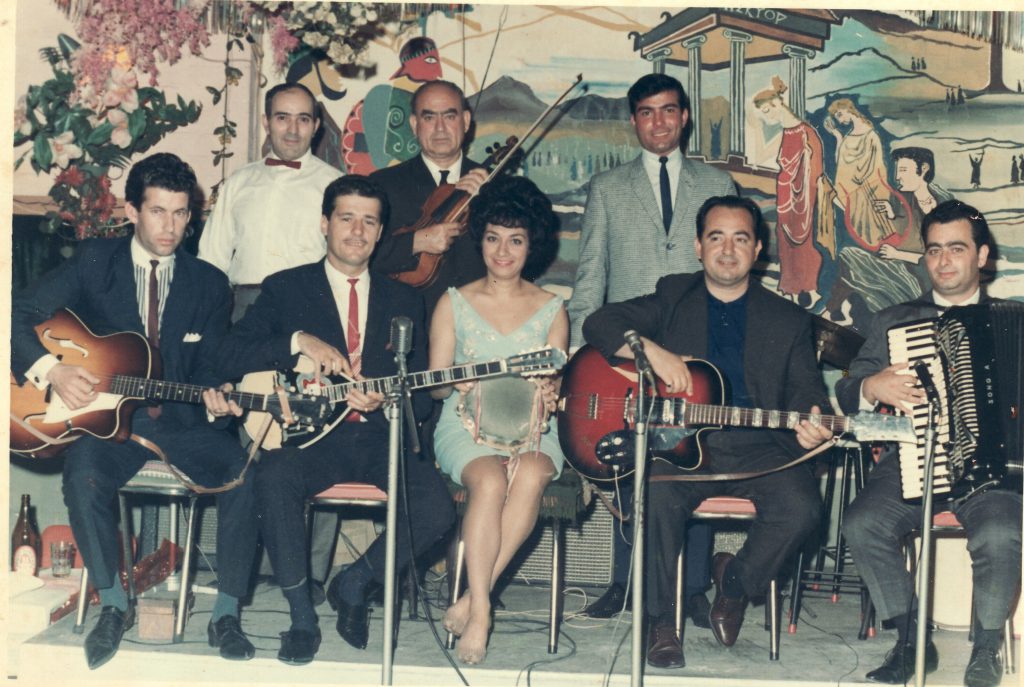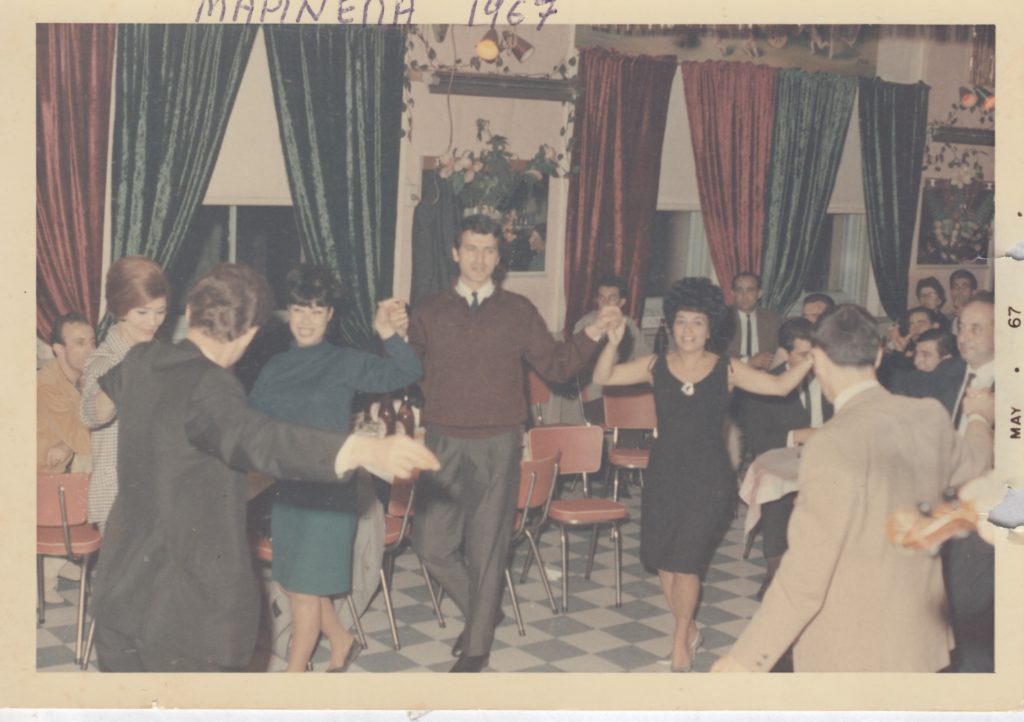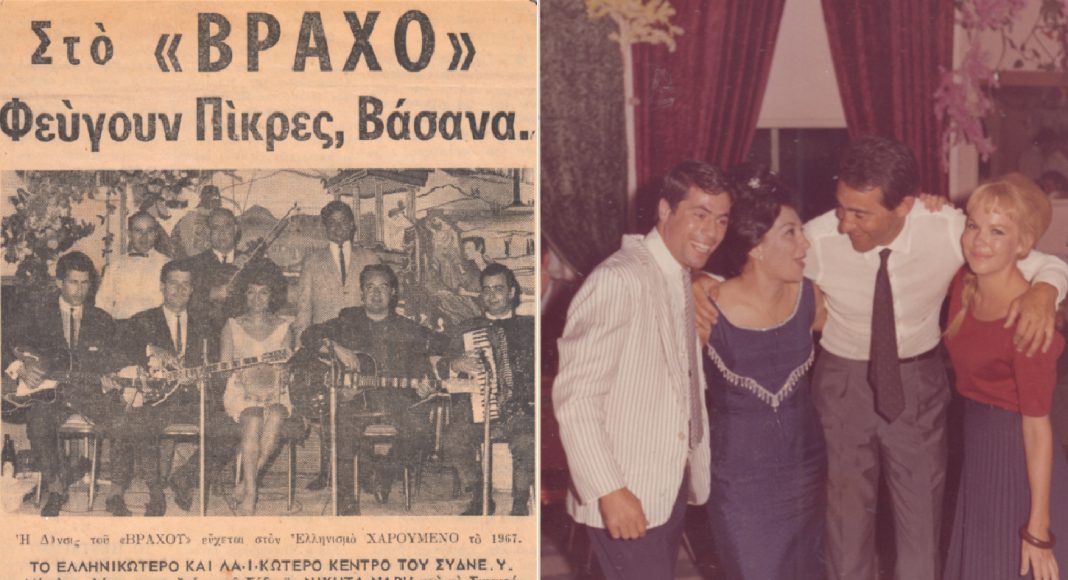By Vasilis Vasilas
With the large numbers of Greek migrants in Sydney during the late 1950’s and early 1960’s, there was an increasing demand for the community’s social alternatives. Whether it be the creation of Pan-Hellenic Soccer Club or the Greek cinema in Redfern, these freshly-arrived needed a social to accommodate both their homesickness for their homeland and to express their Greek culture in their adopted homeland.
With music such an integral part of the Greek culture, it was inevitable for the creation of a local Greek music scene. The opening of Vrahos Nightclub in 1963 by Apostolos Markou (from Paleohori, Lesvos), fondly remembered by everyone as “Paul”- with his partner, Nikitas- was part of the genesis of Sydney’s Greek music scene. Situated on corner of King and Mary Sts, Newtown, it was conveniently positioned in the heart of the Greek inner city communities of Enmore, Newtown and Erskinville.
Although Paul and Nikitas may have opened Vrahos, it was another Paleohoritan, Poseidonas Karavas- a maestro played with his own bands in Lesvos as well as playing in some of the successful bands in Athens’ music scene- who encouraged Paul to open a nightclub. He could clearly see there was a need for a Greek night spot in the local area. For four nights a week- Thursday to Sunday- Greek families had a place to dine and eat Greek meals, while listening and dancing to their beloved music.
How the Nightclub got its name Vrahos, a clue can found in the opening song of every night’s performance, “Vrahos, Vrahos, O Kaimos Mou”- a song made famous by legendary Greek singer, Stelios Kazantzidis.

Vrahos’ immediate success was largely based on its appeal to Greek families as Paul’s daughter, Mary, points out, “The Vrahos was structured in a way as to encourage and promote a family atmosphere, as one could bring their children along, even babies in bassinets. The patrons knew that they would have a great night out without having to break the bank. They would enjoy reasonably priced meals, from the tastiest souvlakia (special spices) with chips and salads, the freshest sea food, from King Crabs and lobsters which were both purchased live and cooked on site, to King Prawns and fresh oysters shucked to order; drink to their hearts content, hear a live Greek band and if in the mood get up and dance.”
One of the most successful local Greek singers, Giorgos Lagoutaris, highlights the significance of Vrahos as a social outlet for Greek migrants to satisfy their yearning for relive Greek music and culture.
“Greek migrants would work all week in the factories- doing difficult and monotonous work- and they looked forward to come to Vrahos where they could overcome their frustrations and tiredness- accumulated throughout the week- in a social environment that reminded them of Greece,” explains Giorgos Lagoutaris.
“Living so far away from their homeland, they were thirsty for something Greek. All day they lived and worked in an alien world; on a Saturday night at Vrahos, they felt as though they were in their homeland.”
“Newly- arrived and settled Greek migrants missed their homeland terribly. Ξενητειά was such an enormous challenge to overcome. So, a welcoming place such as Vrahos temporarily soothed their yearning for Greece and, everyone and everything they left behind there,” remembers Nitsa Handakas (with the stage name as Almaz at the time), who sang alongside Nikitas for a number of years.
“I have so many fond memories from Vrahos. One night, the Italian actor, Walter Chiari, and boxing champion, Rocky Gatellari, came into Vrahos and we all took photographs and danced together. Another highlight was definitely the night Greek icon, Marinella, came in and even had a dance with us. She was taken aback by my voice and performance that she actually invited me back to Greece- fate had my roots here in Australia and I could not go.”

The Opening of Vrahos was also a Mytilenian affair; with Paul as one of the owners and Poseidonas as the maestro of the band, most of the members were Mytilenian too. The band’s first bouzouki player was Georgios Gaziaras (from Loutra), Georgios Lagoutaris (from Agiassos) was on guitar and vocals, Dimitrios Karavas (from Paleohori) played accordion and there was also Stratis on violin. As a result of this Mytilenian connection, a substantial part of the crowds were initially Mytilenians too.
The Band catered for most Greek musical tastes- from the laiko-rembetika to the elafra and latin. The band initially more traditional music- based around laika, rembetika, tsamika and nisitika; the arrival of Nikitas and Nitsa (from Egypt) brought the new wave of elafra (“light”) songs at the time. As Lagoutaris explains, “We initially played a lot of older songs. Giazaras, as a bouzouki player, was more along the style of Vasilis Tsitsanis. Nikitas’ style of playing was influenced by Manolis Hiotis- with his quick-playing and solos. So there was a balance of old new in the band.”
With its huge success, Vrahos, was extended to include much more space; its entrance moved from Mary Street to King Street, and a number of Greek Nightclubs had opened- giving the Greek community a variety of music spots to choose from.
Paul and Nikitas had worked up Vrahos into a social institution. After 1971, however, the pair moved on, Giorgos Lagoutaris’ star as a Greek singer continued to shine, and Vrahos was transformed into Mykonos Nightclub by the new owners.
Vrahos nostalgically captures a bygone era in the Greek community; the post-War migrant community was still relatively in its infancy and Paula and Nikitas’ Nightclub satisfied the migrants’ appetite for something Greek.
“I doubt that there is any other night club that can be thought of with fondness and such warm memories as the Vrahos and it was all because of my father, who was the one who by his warm and welcoming personality was able to make everyone feel at home. He was a good man, with a kind heart, too kind at times for his own good, but I can say that no matter what I am so very proud of him, as the Vrahos brought so much joy and a belonging to so many Greek migrants of the day. Even till this day when someone realises who I am they say “You’re the daughter of Paul who use to own the Vrahos,” concludes Mary Markou.





